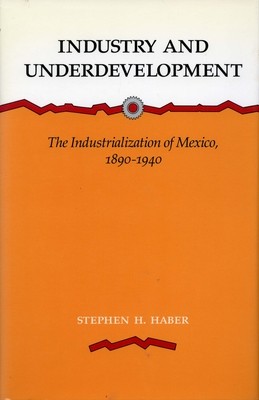
- We will send in 10–14 business days.
- Author: Stephen H Haber
- Publisher: Stanford University Press
- ISBN-10: 0804714878
- ISBN-13: 9780804714877
- Format: 14 x 21.6 x 1.9 cm, hardcover
- Language: English
- SAVE -10% with code: EXTRA
Reviews
Description
The recent economic troubles of Mexico should have surprised no one, for the Mexican economy is an unhealthy one whose basic problems extend back to the nineteenth century - that is the major theme of this study of the formative years of industrialization in Mexico. The author focuses on the forces - economic, political, and technological - that have thwarted Mexican efforts to become a competitive member of the international economic community. Unlike most previous studies, which have relied on aggregate data published by the Mexican government that lump together all industries and all firms, this study is based almost entirely on new material concerning individual companies and individual entrepreneurs. This approach enables the author to examine a wide range of new questions. What were the social origins of Mexico's industrial entrepreneurs? What was their relation to the government of Porfirio Diaz? How profitable were the major manufacturing companies? What effects did the Revolution of 1910-1917 have on the nation's physical plant and on investor confidence? What strategies did firms follow to protect their markets and to prevent competition? The author argues that the roots of modern Mexican industrialization are not to be found in the restructuring of the Mexican economy associated with the Revolution (indeed he contends that the Revolution's effect on the economy has been exaggerated) or in the economic growth stemming from World War II. Rather, he sees the Porfiriato as the decisive era in Mexico's industrialization. By examining the economic constraints on large-scale industrialization during the Porfiriato, he explains the factors that led to an industrial sector marked by concentration of ownership, oligopoly and monopoly production, the inability to compete in international markets, and the need for constant government protection and subsidies.
EXTRA 10 % discount with code: EXTRA
The promotion ends in 18d.20:49:23
The discount code is valid when purchasing from 10 €. Discounts do not stack.
- Author: Stephen H Haber
- Publisher: Stanford University Press
- ISBN-10: 0804714878
- ISBN-13: 9780804714877
- Format: 14 x 21.6 x 1.9 cm, hardcover
- Language: English English
The recent economic troubles of Mexico should have surprised no one, for the Mexican economy is an unhealthy one whose basic problems extend back to the nineteenth century - that is the major theme of this study of the formative years of industrialization in Mexico. The author focuses on the forces - economic, political, and technological - that have thwarted Mexican efforts to become a competitive member of the international economic community. Unlike most previous studies, which have relied on aggregate data published by the Mexican government that lump together all industries and all firms, this study is based almost entirely on new material concerning individual companies and individual entrepreneurs. This approach enables the author to examine a wide range of new questions. What were the social origins of Mexico's industrial entrepreneurs? What was their relation to the government of Porfirio Diaz? How profitable were the major manufacturing companies? What effects did the Revolution of 1910-1917 have on the nation's physical plant and on investor confidence? What strategies did firms follow to protect their markets and to prevent competition? The author argues that the roots of modern Mexican industrialization are not to be found in the restructuring of the Mexican economy associated with the Revolution (indeed he contends that the Revolution's effect on the economy has been exaggerated) or in the economic growth stemming from World War II. Rather, he sees the Porfiriato as the decisive era in Mexico's industrialization. By examining the economic constraints on large-scale industrialization during the Porfiriato, he explains the factors that led to an industrial sector marked by concentration of ownership, oligopoly and monopoly production, the inability to compete in international markets, and the need for constant government protection and subsidies.


Reviews